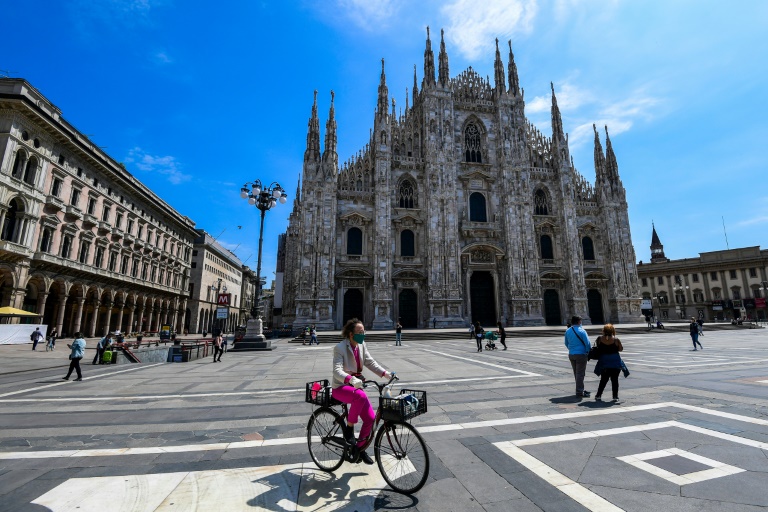
There were signs of life creeping back to normal in Italy as it started to lifty the world's longest lockdown.(Photo: AFP)
Millions of Europeans emerged with relief from coronavirus confinement on Monday, with hard-hit Italy leading the way out of the world's longest lockdown.
At least 3.5 million people are now known to have been infected, but US President Donald Trump offered hope for an end to the pandemic, saying he believed there would be a vaccine by year's end.
Around 248,000 people have died since the coronavirus emerged in China late last year and swept across the globe, given wings by the network of air routes that in normal times keep the modern world ticking.
Lockdowns imposed on half of the planet have derailed economies, and politicians are now grappling with how to get the wheels turning again without sparking a second wave of infections.
Italy -- second only to the United States in its COVID-19 death toll and the first to impose a national lockdown -- was gingerly emerging into the spring sunshine on Monday, with construction sites and factories resuming work.
Restaurants reopened for takeaway orders, but bars and ice cream parlours will remain shut. The use of public transport is being discouraged and everyone will have to wear masks in indoor public spaces.
'Joy and fear'
"We are feeling a mix of joy and fear," 40-year-old Stefano Milano said in Rome.
"There will be great happiness in being able to go running again carefree, in my son being allowed to have his little cousin over to blow out his birthday candles, to see our parents," the father-of-three said.
Italy reported its lowest death toll on Sunday since the first day of the lockdown on March 9 with 174 fatalities, compared with 969 at the peak. In all, 28,884 people have died in Italy.
Many other European countries are also relaxing lockdowns, even as they continue to advocate social distancing, masks and more testing to try to track infections.
Spain made face masks mandatory on public transport starting Monday, two days after finally allowing people out to exercise freely after a 48-day lockdown.
"There are more people with masks, before I didn't see people with them but today, yes," said Cristina Jimenez, 31, as she left a Madrid metro station wearing a mask and gloves.
Neighbouring Portugal allowed small shops, hair salons and car dealers to resume business from Monday, but ordered face masks to be worn in stores and on public transport.
Slovenia, Poland and Hungary joined Germany in allowing public spaces and businesses to partially reopen.
'History of infecting the world'
The pressure to reopen business is also being felt across the Atlantic, where the previously booming US economy was supposed to be the centrepiece of Trump's November re-election bid.
But weeks of lockdown have left 30 million Americans out of work and businesses in trouble, with US clothing retailer J. Crew filing for bankruptcy on Monday.
With his poll numbers sagging, Trump has increasingly taken to blaming China for the outbreak, and says there is proof it started in a Chinese laboratory.
China denies the claims, and the US Director of National Intelligence has said analysts are still examining the exact origin. Most scientists say the disease arose naturally in the animal kingdom and jumped to humans.
But US Secretary of State Mike Pompeo ran with his boss's position, citing "enormous" evidence that the virus originated in a lab in Wuhan, the Chinese city where the virus first emerged.
"Remember, China has a history of infecting the world and running substandard laboratories," Pompeo said Sunday.
The renewed anti-Chinese rumblings from Washington set financial markets on edge on Monday.
Trump offers vaccine hope
The United States has the most coronavirus deaths in the world at more 67,600.
Trump had initially played down the virus, before later warning that it could cost 60,000 lives, but at a live TV event on Sunday he acknowledged a higher eventual death toll.
"Look, we're going to lose anywhere from 75, 80 to 100,000 people," he said. "That's a horrible thing."
But Trump forecast great leaps in prevention over the coming months.
"We are very confident that we're going to have a vaccine at the end of the year, by the end of the year," he said. He then acknowledged: "The doctors would say 'well, you shouldn't say that.' I'll say what I think."
Germany's health minister on Monday poured cold water on that optimism, saying vaccines can "take years".
'Trans-Tasman bubble'
Many parts of Asia have, however, begun to inch towards a post-pandemic life, with schools in the Vietnamese capital Hanoi reopening on Monday after two weeks without new infections anywhere in the country.
Malaysians headed back to work, while Australia and New Zealand discussed creating a "trans-Tasman bubble" that would allow travel between the two countries.
But regional heavyweight Japan extended its state of emergency to the end of the month, despite a comparatively small-scale outbreak.
The disease continues its march in some places.
Russia is rapidly becoming Europe's blackspot, with officials in Moscow urging residents to stay home in an effort to tamp down the growing daily tally of new cases.
"The threat is apparently on the rise," Moscow mayor Sergei Sobyanin told citizens.


